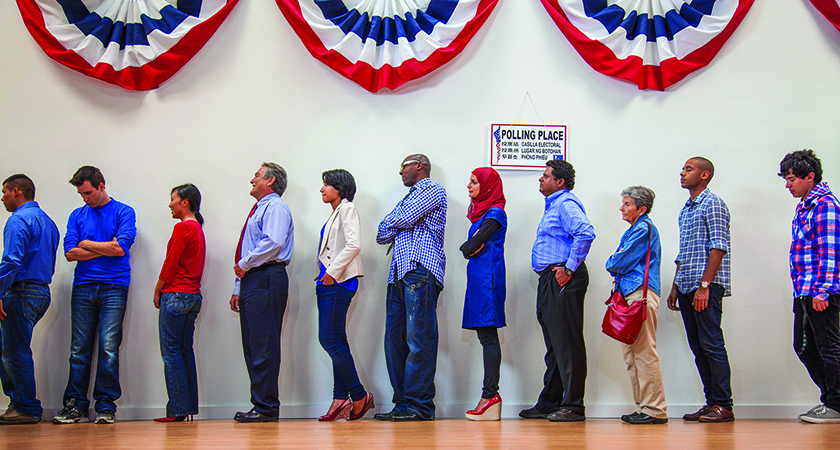Conditions of possibility for religious freedom
First Five by the Freedom Forum Institute
Mar 5, 2020
By Benjamin Marcus
Download Word doc here.
Americans sometimes assume they are equipped with everything they need — laws, policies and cultural norms — to exercise their right to religious freedom. But is that true? What circumstances need to exist for religious freedom to be possible? What conditions must already be in place if Americans are to exercise their right to believe and act in accordance with their religious identities?
Corey D. B. Walker, a religious studies scholar at the University of Richmond, recently raised these questions at a course exploring African-American perspectives about religious freedom. Drawing on the work of Enlightenment philosopher Immanuel Kant, Walker asked students to consider the “conditions of possibility” for religious freedom. So, what are the conditions necessary for enabling religious freedom in the first place?
Consider the Trump administration’s proposed changes to rules in nine federal agencies. The changes are complex and differ somewhat across agencies, but one common theme is the elimination of certain religious liberty protections for social service beneficiaries. These rules were implemented pursuant to an executive order signed by President Obama in 2010 (Executive Order 13559). With this order, President Obama embraced recommendations made by his inaugural Advisory Council on Faith-based and Neighborhood Partnerships, which was comprised of both progressive and conservative religious and community leaders. The order states in part:
If a beneficiary or prospective beneficiary of a social service program supported by federal financial assistance objects to the religious character of an organization that provides services under the program, that organization shall, within a reasonable time after the date of the objection, refer the beneficiary to an alternative provider.
In other words, a religiously affiliated group — like a Christian, Jewish, Islamic, Hindu, Buddhist or Sikh ministry or aid society — can receive a federal grant or contract to provide a social service such as emergency shelter, food supplement or job training programs, addiction treatment services and more. If a religiously affiliated group does so, then the group must refer beneficiaries (those who receive the service) to other groups if the beneficiary objects to the religious affiliation or character of the service provider.
Furthermore, the rules require social service providers to notify beneficiaries that they can request such a referral. The task force that made these recommendations asserted that beneficiaries cannot be expected to know about these protections — social service providers are responsible for informing them.
The Trump administration would eliminate the alternative provider requirement. It would also no longer obligate social service providers to notify beneficiaries that they could request an alternative provider. Beneficiaries could still seek a referral to such a provider, but they would not be told about that option. But under the proposed rule, providers would not be required to try to find an alternative provider.
Do the proposed rules create the “conditions of possibility” for religious freedom? The Trump administration argues the rules would put religious social service providers on a level playing field with non-religious providers, thereby promoting one possible condition for freedom: equality. The administration contends that the alternative provider requirement and beneficiary notice are discriminatory for placing special obligations on religious social service providers. They say those rules are in tension with recent U.S. Supreme Court decisions. Others assert that these requirements are consistent with the Establishment and Free Exercise Clauses in the First Amendment. And the Supreme Court cases that the Trump administration cites involve governmental policies that refuse to allow religious bodies to compete for state funding or religious individuals to run for certain public offices, not reasonable conditions that apply to government grants religious bodies do receive.
In either case, the Trump administration’s proposed rules would eliminate another condition for freedom: knowledge. If social service beneficiaries are not notified about these religious liberty protections, they may not know that they can request a different religious or non-religious provider. Our judicial system has long acknowledged the link between knowledge of rights and the ability to exercise those rights. Anyone who has watched a crime show knows that the police need to read suspects their Miranda rights, for example.
The Trump administration should not eliminate the alternative referral requirement and beneficiary notice if they want to safeguard the conditions that make religious freedom possible. Even if one accepts their claim that the alternative provider and beneficiary notice requirements present a possibly unconstitutional burden on religious social service providers — a claim vigorously disputed by some church-state lawyers, including Melissa Rogers — the administration could maintain these religious liberty protections for beneficiaries in other ways. The administration could require both religious and non-religious social service providers to make referrals to alternative providers and notify beneficiaries about religious liberty protections for them. Or governmental bodies, not providers, could notify beneficiaries of existing protections. (As Melissa Rogers notes, “[t]he only indefensible approach would be to end such religious freedom requirements”).
Too often those in power present religious freedom as a zero-sum game. In this case, the Trump administration argues that the government can extend religious liberty protections to social service providers or beneficiaries, but not both. But the administration can maintain protections for both and thereby affirm conditions that both conservatives and progressives argue are necessary for religious freedom to exist at all.
A British Council survey released to the public earlier this year found that 89 percent of people in the United States agree that freedom of religion or belief is a fundamental right. As Americans, we should urge the government to do everything it can to create the conditions that make it possible for Americans of all religions and none to exercise that fundamental right.
I am grateful to Melissa Rogers, former executive director of the White House Office of Faith-based and Neighborhood Partnerships (2013-2017), for sharing her comments on the proposed rule changes by the Trump administration. Her insightful feedback inspired this column.










